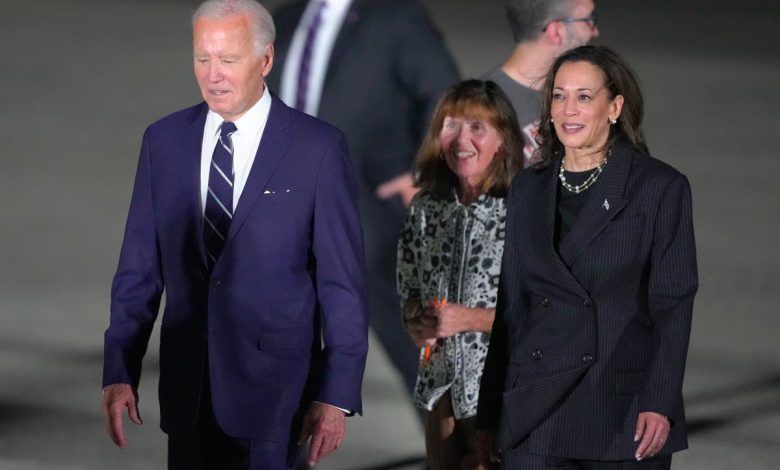Kamala Harris is pivoting to the center while Trump’s new policy ideas confuse Republicans

After the imbroglio about Donald Trump’s racist comments questioning whether Vice President Kamala Harris is in fact Black or Indian (she’s both), Senate Republicans immediately found themselves on the back foot once again.
Trump bizarrely floated the idea of eliminating taxes on Social Security benefits, much to the GOP’s befuddlement.
It could not have come at a worse time. Republicans had just blocked a tax package that included plenty of incentives for businesses and an expanded Child Tax Credit on Thursday. They are doing this because they hope that if Trump wins and they flip the Senate in November, they can get a better deal where they can simply extend the 2017 tax cuts that Trump signed into law.
Senate Minority Whip John Thune seemed uncomfortable talking about it all as he waited for his car to leave Washington for South Dakota.
“Well, we’ll see,” Thune told The Independent, when asked about eliminating taxes on Social Security benefits might cost. “I mean, obviously, that’s got a fairly big score. We’ll cross all those bridges.”
Thune is in the running to become Republican leader in the Senate when Mitch McConnell steps aside later this year. As Whip, he’s responsible for counting votes. But he’s still very much a small-government, pro-business Republican and removing taxes on Social Security — to say nothing of Trump’s idea to remove taxes on tips — would blow a huge spending hole in the GOP’s plans. Frankly, they’d much rather use that money on corporate tax cuts or reducing the rate for top earners.
By contrast, Democratic Senator Brian Schatz of Hawaii, one of the biggest climate hawks in the Senate, said he was not fazed by reports that Kamala Harris had changed one of her own positions. Harris now opposes a ban on fracking.
“If she doesn’t win, we can’t do a damn thing,” he told The Independent this week.
The two parties now find themselves in opposing spots: Republicans are having to throw out their best-laid plans in exchange for Trump’s priorities while Democrats have one goal: “Just win, baby.”
Harris’s flip on fracking comes as she hopes to lock Pennsylvania — another reason she is considering naming its governor, Josh Shapiro, as her running mate. Harris also has to make sure Senator Bob Casey — the state’s most senior Democrat — wins re-election if she wants to pass anything on climate.
“I know personally what it means to the people of Pennsylvania in terms of job creation, in terms of having giving us an alternative source of energy which almost singlehandedly has allowed us to be virtually free of Middle East oil or significantly less dependent,” he told The Independent. “And so I know the benefit to our state, and I think that the vice president has seen that over time.”
Presidential candidates typically pivot to the center for a general election, even if, in Harris’s case, she did not go through a grueling primary where she espoused more progressive policy positions.
At the same time, Harris had a fairly liberal voting record in the Senate — which should come as no surprise, given that she represented California. Indeed, between 2019 and 2021, she voted to the left of Bernie Sanders.
But being a freshman senator from California is quite different to being the leader of a party. Now she has to focus on shoring up Democrats downballot and winning in states that aren’t as left-wing as the West Coast.
Senator Joe Manchin, who has in the past clashed with Harris, all but celebrated her move to the center.
“It’s wonderful,” he told The Independent. “Basically, that’s where we live our lives.“
By contrast, Senator Thom Tillis of North Carolina — who has collaborated and clashed with Trump in equal measure — seemed to wince when talking about Trump’s proposal to remove taxes on Social Security payments, something that would almost certainly boost support among a key demographic for Republicans: older Americans.
“We’ve got a lot of priorities from President Trump,” he told The Independent, noting how Republicans will need to balance multiple priorities if they get a trifecta win in the House, Senate and presidency.
And here lies the GOP’s predicament. During his years in the White House, Republicans ignored Trump’s tweets or his attempts to subvert the rule of law since he saw them as their best shot to cut taxes and confirm a litany of judges.
But they could not ignore his whims. The same thing happened recently as the head of Project 2025 stepped down after Trump tried to distance himself from it.
By comparison, as painful and convoluted as the Democrats’ past month after the debate were, the internecine argument circled around one thing alone: What would it take to win?
That’s largely because the GOP has reduced itself not to a party devoted to electing Republicans or even promoting Trumpism but purely to promoting Donald Trump. The Democratic Party, by contrast, remains a normal, functioning party.







